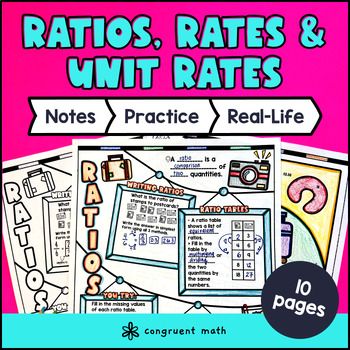Want more ideas and freebies?
Get my free resource library with digital & print activities—plus tips over email.
Join for Free Resources →
$4.25
Ever wondered how to teach ratios, rates, and unit rates in an engaging way to your 6th-grade students?
In this lesson plan, students will learn about ratios, rates, and unit rate and their real-life applications. Through artistic, interactive guided notes, with practice on writing ratios, filling out ratio tables to generate equivalent ratios and rates, calculating unit pricing, and word problems on ratios and rates. Also included is a color by number activity for students will gain a comprehensive understanding of the topic in a fun way. The lesson culminates with a real-life example that explores how unit pricing can be used to compare two products in the grocery store.

$4.25
After this lesson, students will be able to:
Before this lesson, students should be familiar with:
As a hook, ask students why unit pricing is important when shopping. Ask students if they ever had to comparison shop. What helped them to decide between several items? Refer to the last page of the guided notes as well as the FAQs below for ideas.
Use the guided notes to introduce the concepts of ratios, rates, and unit rates. Walk through the key points of each topic to teach. Refer to the FAQ below for a walk through on this, as well as ideas on how to respond to common student questions. Have students walk through the "Ratio, Rates, Unit Rates" notes section. Call on students to talk through their answers, potentially on the whiteboard or projector. Based on student responses, reteach concepts that students need extra help with.
Have students work through the problems on the ratio, rates, unit rates practice sheet, either collaboratively or independently. Walk around and spot-check student answers on the check for understanding activity. Based on student responses, reteach concepts that students need extra help with. If your class has a wide range of proficiency levels, you can pull out students for reteaching, and have more advanced students begin work on the practice exercises.
Then, have students practice the concepts of ratios, rates, and unit rates using the Color by Number activity. The activity includes a variety of problems, including writing ratios, calculating unit pricing, and solving word problems on ratios and rates. Walk around the room to answer student questions and check for understanding.
Fast finishers can dive into the Real-Life Application section of this lesson plan to explore how unit pricing can be used to compare two products in the grocery store. You can assign it as homework for the remainder of the class.
Bring the class back together, and introduce the concept of unit pricing as a tool for comparing the cost of two products in the grocery store. Explain and hold a discussion on how unit pricing can help consumers make informed decisions about which products to purchase.
Have students work in small groups to compare the unit pricing of two similar products, such as two brands of cereal or two sizes of juice. After completing the activity, have students share their findings with the class and discuss any trends or patterns they noticed. Refer to the FAQs for more ideas on how to teach this concept!
**If you're looking for digital practice for ratios, rates, and unit rates, try my Pixel Art activities in Google Sheets. Every answer is automatically checked, and correct answers unlock parts of a mystery picture. It's incredibly fun, and a powerful tool for differentiation.
Here are 4 self checking Google Sheets explore:
Another fun way to practice ratios, rates, and unit rates is Farming Math Project. Students play the role of a summer intern at a farm, and use their math skills to plant and harvest vegetables (ratios), make sales in a farmer's market (rates), and cook vegetable soups using different recipes (ratios and more advanced conversions). It's the perfect project-based learning, unit review, exam prep, or sub plan to culminate your unit with!
Another fun, no-prep way to practice ratios, rates, and unit rates is Doodle & Color by Number — they’re a fresh take on color by number or color by code. It includes multiple levels of practice, perfect for a review day or sub plan.
Ratios are a way to compare two quantities that can be expressed as a fraction.
A rate is a ratio that compares two quantities with different units of measure.
A unit rate is a rate in which the second quantity in the comparison is one unit.
Equivalent ratios are ratios that have the same value.
A ratio table is a table used to find equivalent ratios by multiplying or dividing by the same value.
Unit pricing is the cost of one unit of an item.
The guided notes section of this lesson plan provides a great starting point for teaching these concepts. You can also use the check for understanding activity to reinforce learning. Finally, the real-life application section provides a great opportunity to show students how these concepts can be used in the real world.
Consider incorporating the extensions provided in this lesson plan, such as the digital activity, math project, or print activity. These activities can help students apply what they have learned and make the lesson more engaging overall.
Get my free resource library with digital & print activities—plus tips over email.
Join for Free Resources →